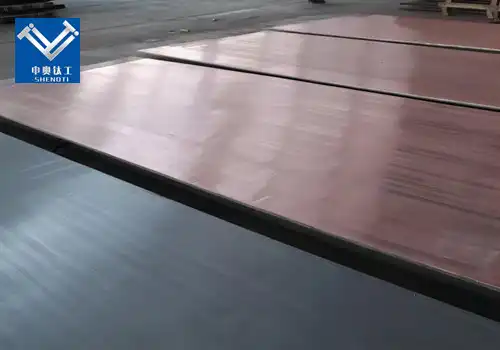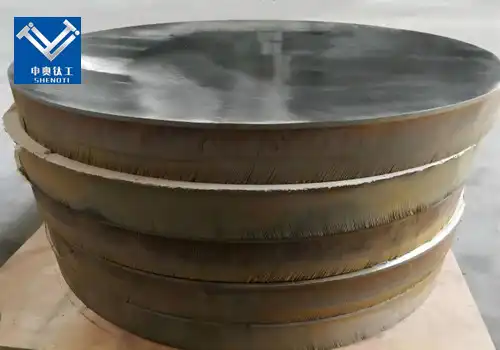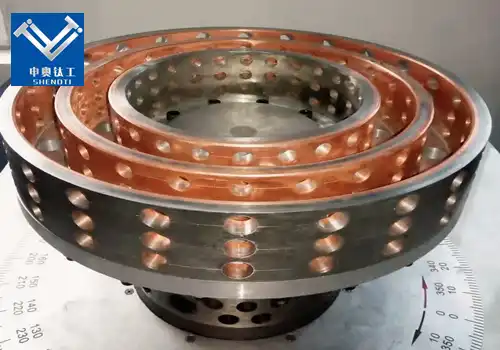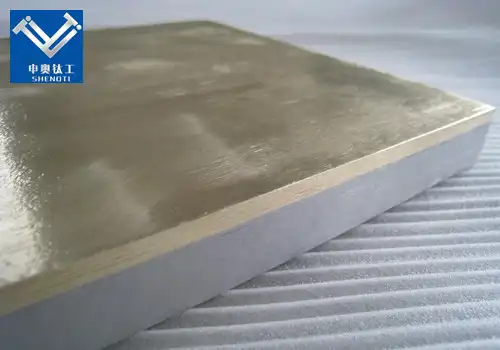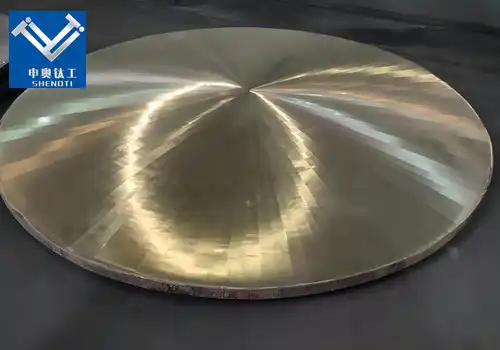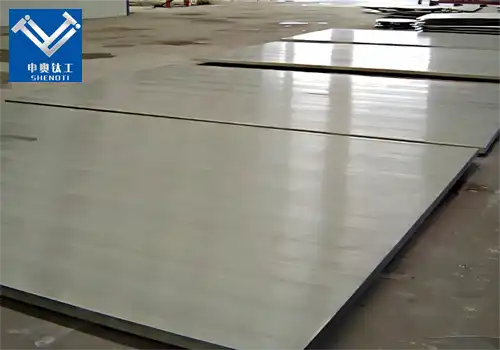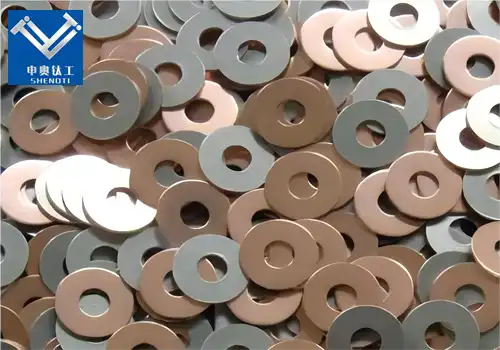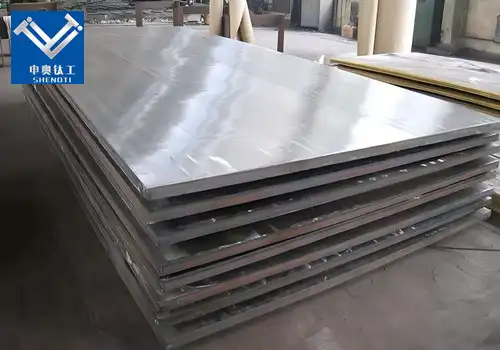
Applications of Titanium Clad Steel Plate Across Key Industries
2025-07-08 16:23:51
What Is Titanium Clad Steel Plate?
Titanium clad steel plate is a type of bimetallic composite material that combines the high corrosion resistance of titanium with the strength and cost-effectiveness of carbon or stainless steel. This unique material is manufactured by bonding a layer of pure titanium (usually Grade 1 or Grade 2) to a steel base plate (such as Q235B, 304, or SA516) through advanced techniques like explosion cladding, hot rolling, or explosion + rolling hybrid methods.
The result is a titanium clad steel plate that exhibits exceptional mechanical properties, outstanding resistance to corrosion, and significant cost savings compared to using solid titanium. Due to these features, titanium clad steel plates are increasingly adopted in industries such as:
Chemical processing
Power generation
Desalination
Marine engineering
Aerospace
Medical and pharmaceutical equipment manufacturing
Key Advantages of Titanium Clad Steel Plate
1: Outstanding Corrosion Resistance
Titanium offers superior corrosion resistance, particularly in harsh environments involving acids, alkalis, seawater, or chlorine-containing media. When clad onto steel, it acts as a protective layer, shielding the base metal from degradation and extending the life span of industrial equipment.
2: High Strength and Structural Integrity
The steel base of the titanium clad steel plate provides excellent mechanical strength and load-bearing capacity. This makes it suitable for fabricating pressure vessels, heat exchangers, pipelines, and reactors in demanding industrial settings.
3: Cost Efficiency Compared to Solid Titanium
Using solid titanium components can be prohibitively expensive. By employing a titanium clad steel structure, engineers can reduce material costs while retaining the corrosion-resistant benefits of titanium on the surface. This solution offers up to 50% cost savings, making it the preferred material in cost-sensitive industries.
4: Lightweight and Weldable
Despite being a composite, titanium clad steel plate is relatively lightweight and can be welded, formed, and machined like traditional metals. Special welding techniques, such as titanium overlay welding or explosive welding seams, ensure reliable and leak-proof joints.
Applications of Titanium Clad Steel Plate Across Key Industries
1: Chemical Processing Industry
In chemical production, reactors, storage tanks, and distillation columns must withstand high temperatures and corrosive environments. Titanium clad steel plate is ideal for these applications due to its inertness and resistance to sulfuric acid, hydrochloric acid, and nitric acid.
2: Power and Energy Sector
In nuclear, thermal, and hydropower plants, titanium clad steel plates are widely used in heat exchangers, condensers, and pressure vessels. The material resists coolant corrosion and hydrogen embrittlement, improving plant safety and efficiency.
3: Desalination and Water Treatment
Seawater is highly corrosive, especially to metallic components. Titanium clad steel plate is commonly used in multi-stage flash distillation (MSF), reverse osmosis (RO), and membrane filtration units, where anti-corrosive performance is critical for long-term operation.
4: Marine and Offshore Engineering
Offshore oil rigs, ships, and underwater pipelines encounter extreme marine environments. Titanium clad steel resists salt spray, chloride ions, and biofouling, making it a top material for marine-grade structural applications.
5: Aerospace and Medical Manufacturing
While less common, titanium clad steel plates are finding their way into lightweight aerospace structures and surgical equipment components, where biocompatibility and strength-to-weight ratio are vital.
Manufacturing Technologies of Titanium Clad Steel Plate
The production process plays a crucial role in determining the quality and performance of the final product. There are several recognized bonding techniques used in titanium clad steel plate manufacturing:
1: Explosion Cladding
This technique involves detonating explosives to forcefully bond the titanium sheet to the steel base at high velocity. It produces a metallurgical bond without melting the metals, preserving the properties of both layers.
2: Hot Rolling Cladding
Hot rolling bonds the metals by applying heat and pressure during rolling. This process yields plates with uniform thickness and excellent flatness, suitable for large-scale production.
3: Explosion + Hot Rolling Hybrid
This combines the advantages of both methods, achieving strong adhesion and precise dimensional control. It is often the preferred technique for producing titanium clad steel plates with large sizes and complex shapes.
Quality Standards and Specifications
To ensure reliability, titanium clad steel plates must meet international and industry-specific standards. Commonly referenced standards include:
ASTM B898 – Specification for clad plates of titanium and steel
ASME Section VIII Div.1 & Div.2 – Boiler and pressure vessel codes
GB/T 8547 – Chinese standard for explosive bonding composite plates
Choosing a Reliable Titanium Clad Steel Plate Manufacturer
Selecting a qualified manufacturer is key to ensuring the quality, performance, and longevity of your clad plates. A reliable supplier should:
Use certified raw materials
Offer custom fabrication services
Possess ISO 9001 or ASME certifications
Provide ultrasonic testing (UT), shear tests, and corrosion analysis
Maintain consistent production standards and delivery schedules
Baoji City ShenAo Metal Materials Co., Ltd. is one such manufacturer with over a decade of experience in titanium-steel composite materials. With cutting-edge facilities and strict quality control, ShenAo delivers premium titanium clad steel plates tailored to global markets.
Frequently Asked Questions (FAQs) About Titanium Clad Steel Plate
1: How Is the Titanium Layer Bonded to the Steel Plate?
It is bonded using techniques like explosion welding, hot rolling, or a combination of both. These methods form a metallurgical bond at the interface, ensuring high strength and no delamination.
2: Can Titanium Clad Steel Be Welded?
Yes. Special welding techniques such as titanium welding with argon shielding, or transition joint welding, are used to maintain the integrity of the titanium layer while bonding to steel.
3: What Is the Lifespan of a Titanium Clad Steel Plate?
When properly designed and installed, titanium clad steel plates can operate for 20–30 years even in aggressive corrosive environments, significantly reducing maintenance and replacement costs.
4: Is Titanium Clad Steel Suitable for High-Pressure Applications?
Absolutely. The steel base provides the mechanical strength required for high-pressure vessels and pipelines, while the titanium layer ensures resistance to corrosion and chemical attack.
Why Choose Titanium Clad Steel Plate for Your Next Project?
The titanium clad steel plate is the perfect balance between performance and cost in industries where both strength and corrosion resistance are critical. Whether you're engineering a pressure vessel, heat exchanger, or seawater desalination unit, titanium clad steel offers:
Outstanding corrosion resistance
High mechanical strength
Lightweight and weldable properties
Long service life
Reduced material costs
By integrating titanium clad steel plates into your equipment, you invest in durability, efficiency, and long-term value. For customized solutions, competitive pricing, and global shipping, consider partnering with a trusted supplier like ShenAo Metal.
Contact Us
Baoji City ShenAo Metal Materials Co., Ltd.
Specialist in Titanium Clad Steel Plate Manufacturing
Address: Baoji City, Shaanxi Province, China
Email: zh@baojiti.com.cn
Website: www.shenaocladplate.com
YOU MAY LIKE











